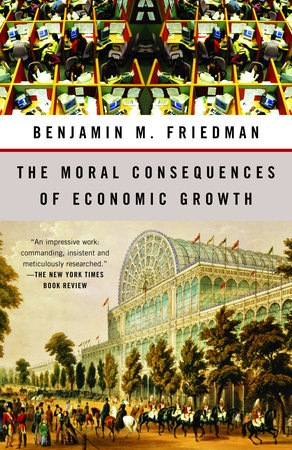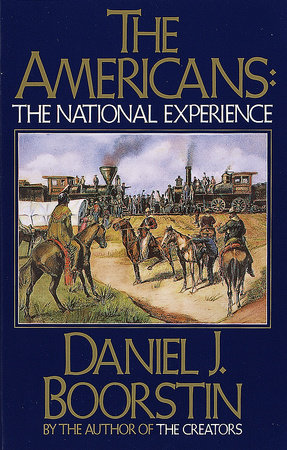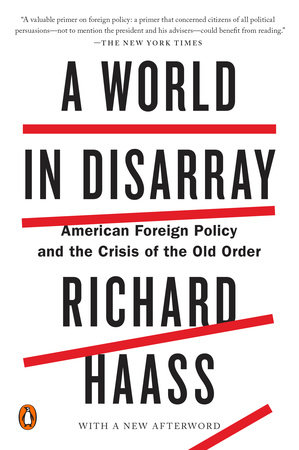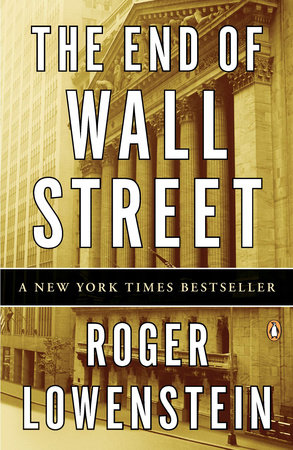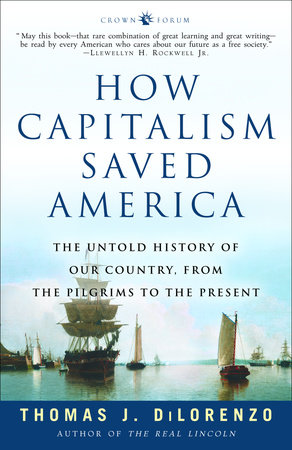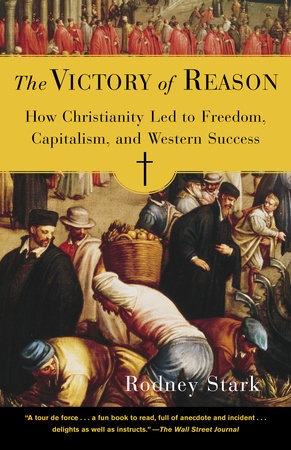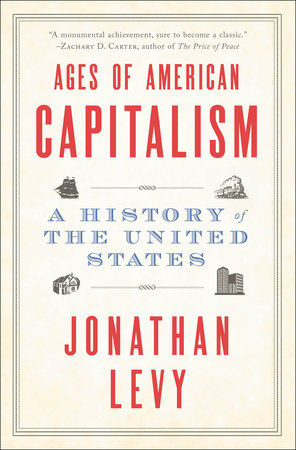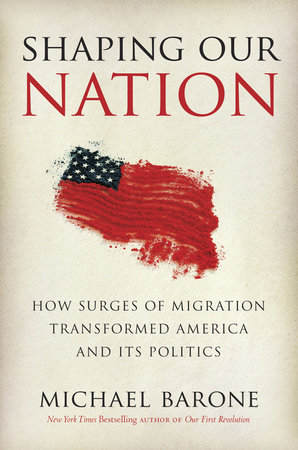Q: You call your book The Moral Consequences of Economic Growth–what exactly do you mean by "moral consequences"?
A: My book focuses on how economic growth, or its absence, shapes the moral character of a society: how we live with one another, how we govern ourselves, whether we’re tolerant toward one another and generous toward those who need help. In part these are matters of personal attitudes and personal behavior. But in many respects–whether our democratic institutions are sound, for example, or whether people who work hard have opportunities to get ahead–the society has to be judged as a whole. The central point of my book is that for the broad majority of a society’s citizens, whether or not living standards are rising importantly influences all of these dimensions of its moral character.
Q: How would you describe the differences between "moral consequences" in developed and developing countries?
A: Two differences stand out. First, in many developing countries living standards are so low that basic human survival is an issue for large parts of the population. Rising incomes bring fewer early deaths, less malnutrition and disease, more widespread literacy and improved education. All of these improvements matter in and of themselves, of course, but they also powerfully affect the kind of moral dimensions of a society that my book emphasizes. Second, while most of the world’s economically developed countries today are already functioning democracies, where the question in this regard is how their existing democratic political institutions are changing, in many developing countries the challenge is to create effective democratic institutions where none exist.
Q: How important is it that the growth be continuous, and how great must the growth be?
A: What’s important is that the majority of people have the sense of getting ahead–that they’re living better than they used to, that their job prospects are improving, that they’re providing for their children in ways that represent improvements on how their parents provided for them, and that prospects for their children’s careers offer opportunities for them to keep moving forward in their turn. None of this requires precisely steady growth on a year-by-year basis, and so my book isn’t about short-term business cycles. Comparisons over a longer period are what matter. Your question about how great the growth must be to deliver the moral benefits my book outlines is harder, in part because the answer varies from one country’s context to another. Here in the United States, our average growth in income per person over nearly two centuries has been a little less than 2 percent per annum, so that our standard of living has doubled every thirty to forty years. That’s an impressive record, over so long a span of time, and it’s been sufficient to deliver enormous advances in our democracy, our tolerance, and our sense of fairness. But at times when that growth has faltered for extended periods, we’ve made no progress, or even retrogressed, on just those fronts.
Q: What aspects of American society have shown this kind of progress, then retreat, and then progress again over such a long time span?
A: Think, for example, about attitudes toward immigrants–always an important issue in a country like ours: Why was there so much anti-immigrant violence in the 1850s? Why did it pretty much disappear after the Civil War? Why was there then a resurgence of very ugly anti-immigrant agitation in the 1880s and 1890s? Why did that give way, after the turn of the twentieth century, to welcoming–and “Americanizing”–large numbers of immigrants? (In the years just before World War I, the Fourth of July was called “Americanization Day.”) Then, in the 1920s, why did Congress put in place the most restrictive immigration rules the United States has ever had? Why were those restrictions thrown out in the 1960s? Where did the new anti-immigrant agitation of the 1980s and early 1990s, like California’s Proposition 187, come from? And why did that in turn die down to such an extent that the one candidate who ran for President with an explicitly anti-immigrant stance in 2000, Patrick Buchanan, got nowhere even in the Republican primaries? It would be foolish to pretend that all these turnings were due purely to economic forces. But as the book shows in some detail, the strength or weakness of economic growth had a lot to do with it.
Q: Does the experience of other countries show similar patterns?
A: The most obvious example of real disaster following from economic stagnation is the rise of Nazism in Germany. The Nazi Party grew at first out of the economic and social turmoil that Germany suffered after World War I. But the Nazis’ rise to power followed only after Germany plunged into the economic abyss of the Great Depression. And there are plenty of other examples as well, including both positive developments and negative ones. The book looks at the histories of not only Germany but also Britain and France. In all three–as in America–the dominant pattern is that steps toward greater tolerance and stronger democracy and more widespread opportunity tend to follow periods of economic growth, while the opposite happens when economies stagnate or decline.
Q: In talking about the developing world, you make the point (p. 305) that economic growth enables conflicting groups–in ethnic strife for example–to compromise with each other because they will be less inclined to suspect that others are doing better at their expense. Are you saying that economic growth is a tool that can be employed to counteract the festering problems in the world?
A: True, rising incomes don’t solve all problems, but they certainly make a lot of them–including in particular many of the problems that developing countries face–easier to deal with. You mention ethnic strife, for example. Often ethnic conflict is at root a struggle over who gets the most out of a society’s limited resources: who gets good jobs, or which neighborhoods get streets and sewers and apartment buildings, or where to locate new hospitals. Especially in the developing world, where poverty is widespread and effective resources are limited in ways that are sometimes hard for us even to comprehend, economic growth creates the capacity to do more of all those things, so that more groups–if the growth is sufficient, everyone–can have the sense of getting ahead.
Q: Professor Friedman, are you saying that even in the poorest of the poor countries, economic growth can make a difference?
A: Yes. The point of my book is that economic growth matters in part because it brings positive changes in a society’s social attitudes and political institutions, and ultimately its moral character. But let’s not forget that rising incomes–and that’s what economic growth means–bring material benefits as well, and that the poorer a country is, the more important those material improvements are. In poor countries, as incomes rise people eat better, live longer, suffer fewer diseases and get better medical care; more people learn to read and write, and more become aware of the broader world around them. In the United States we sometimes take all these matters for granted. In sub-Saharan Africa people don’t because they can’t.
Q: You point out that from a standing start political and social freedoms normally follow a period of economic growth by as much as a quarter century–doesn’t this extremely slow rate of response make supporting fragile democracies like those in Afghanistan and Iraq extremely important over the long haul?
A: It makes that task both important but also difficult. To the extent that economic conditions are part of what makes a society able to sustain a democracy–and that’s a long-standing notion–jump-starting a democracy in a country where poverty is everywhere and growth is nowhere is a pretty daunting challenge. There are all too many examples of places where some outside power put in place the formal institutions of a democracy, only to see them wither and collapse because the society wasn’t ready to sustain them. This doesn’t mean we shouldn’t try to create democracies in Afghanistan and Iraq; surely we should. But we also need to remember, especially in Afghanistan which is much poorer, that successful economic development is necessary if that democracy is going to survive.
Q: In the book you make the argument that global trade leads to increased economic growth in developing countries, which in turn improves people’s living conditions and political freedoms–the same countries that are more regularly seen in the news as victims of globalization and a cause for protest whenever the WTO meets. Is it fair to say that you are in favor of increased globalization with fair tariffs and trade agreements and that you don’t think these countries are getting a raw deal for the most part?
A: Experience shows pretty clearly that the developing countries that have participated in the advancing globalization of the world economy have mostly gained from doing so. The biggest losers by far have been countries that have stood aside. What I think is a raw deal is that some poor countries are precluded from participating in globalization because of restrictions imposed by countries that are much richer–for example, quotas that we impose, here in the United States, to keep out agricultural imports. We do this in order to protect our domestic agriculture. But for the most part the benefits go to agribusiness corporations and other large-scale producers, most of whom already have high incomes even by American standards. Small-scale farmers mostly miss out. The big losers, however, are the low-income countries that can’t sell here what they produce. (And, of course, American consumers also lose because we have to pay more for protected items, like sugar, that these quotas keep out.)
Q: We want to foster economic growth, but does that mean we just have to roll over for businessman and give them everything they want? What limits do we have to impose?
A: Fostering economic growth certainly doesn’t mean automatically saying yes to whatever business–or, for that matter, labor, or farmers, or any other constituency–proposes. We need to keep in mind that the primary objective of our economic policy is to help America become more productive and competitive, and therefore enable our economy to deliver a rising standard of living to as many of our citizens as we can. Further, to the extent that one reason we want to encourage economic growth in the first place is to foster the kind of social, political and moral advances on which my book focuses, it makes no sense to spur growth with policies that, at least in the short run, undermine those more fundamental objectives. Instead, whenever we can, we should turn to growth-promoting policies that also enhance opportunity and fairness in our society–for example, programs that enable more young Americans, including those from disadvantaged backgrounds, to get the education they need to become productive members of the work force during their adult lives.
Q: The tax cuts of 2001, 2003 and the current estate/death tax repeal seem particularly short-sighted given the dire effects of the enormous deficit that you describe in the last chapter of your book. Why don’t people worry more about deficit management? Having just finished your book, I’m having trouble sleeping! Are you fearful about America’s future?
A: I wish more Americans today were worrying about the damage that sustained large-scale government borrowing is doing to our country’s economic growth. There’s a false sense today that because we managed to overcome the deficits that grew out of the Reagan budget policies, in the 1980s and early 1990s, we needn’t do anything about the problem now, that the deficit will take care of itself. That’s a serious misreading of what happened. The deficits of the 1980s turned into surpluses by the mid-1990s not just because the economy did well but also because of two rounds of tax increases (in 1990 and 1993) and two rounds of spending cuts (in 1993 and 1995). Whether by tax increases or spending cuts, or more likely both, today we need to take positive steps to restore our government’s fiscal balance. Putting the government budget in order will help our economy grow, and that in turn will help us maintain, and over time even enhance, the social and political strength of our democracy.
Q: In the final chapter of the book, you lay out some proposals to improve America’s economic growth prospects–raising taxes, radically overhauling Medicare and social security, increasing the rate of saving in America and, as a priority, improving education. What will it take to make these changes? How important is it that they happen?
A: Precisely because our economy has been delivering so little improvement for the great majority of Americans–an increase of only .7 percent per year over the last 30 years for those in the middle of the income distribution–it’s important to do whatever we can to spur our growth. And that challenge will become all the greater in just a few years, when the baby-boom generation starts to draw on Social Security and Medicare. I think we know what we need to do on the policy front. What’s missing is the political determination to make the necessary changes. Part of the point of a book like mine is to help make clear, to as many people as possible, what’s at stake. The chief message of my book is that what’s at issue is far more than just economic performance. The moral character of our society is at risk as well.
